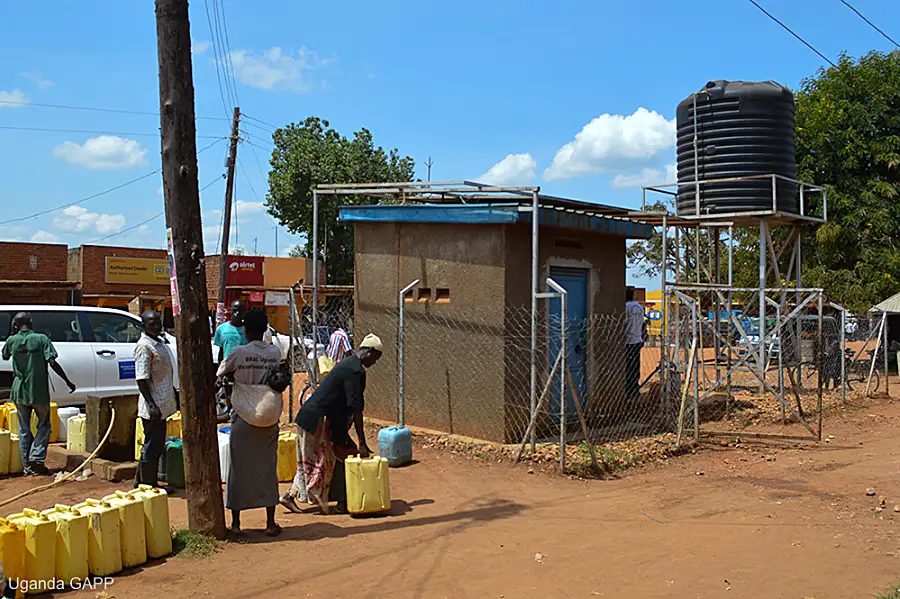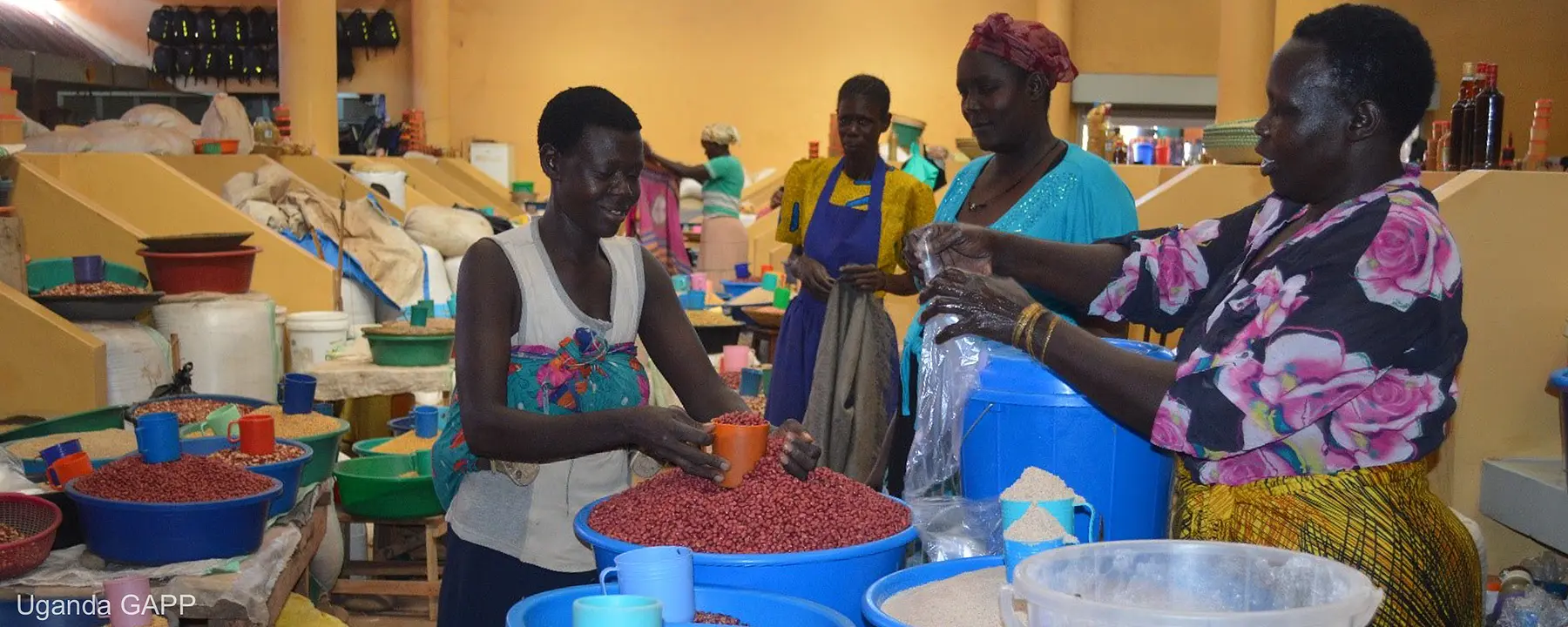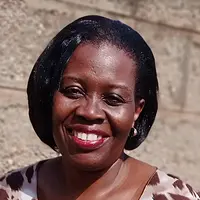Empowering Local Governments and Communities to Improve Services
Previously, in many areas of Uganda, citizens had limited skills and incentives to participate in the governance process. The existing processes to gather input on community needs were weak, and there was little oversight to deter corruption. Inadequate local government financing and weak local government systems also hindered the quantity and quality of services provided.
To help address these issues, the Governance, Accountability, Participation, and Performance (GAPP) project, led by RTI, was launched in 2012 to work with Ugandan counterparts to strengthen local governance service delivery and accountability systems to improve and expand services for its citizens.
Jointly funded by the U.S. Agency for International Development (USAID) and the U.K. Department for International Development (DFID) (now known as the Foreign, Commonwealth and Development Office or FCDO), GAPP worked in 40 districts and 13 municipalities around the country to:
- Improve the legal, policy, regulatory, and institutional environment to meet demands for more democratic governance;
- Enhance fiscal management, leadership, and accountability processes in the delivery of services in 40 districts and 13 municipalities;
- Build the capacity of citizens and communities in these districts to participate in local governance; and
- Strengthen leadership and accountability in the Ministry of Health.
In 2019, the project was awarded a one-year extension by FCDO. Under this extension, called eGAPP, RTI supported core activities in 15 districts and scaled up to 25 districts in April 2020 to support the COVID-19 response. eGAPP also helped increase local government capacity to coordinate COVID-19 interventions and service delivery in the midst of lockdowns and related restrictions.
“A lot of flexibility is required for governance programming to achieve sustainable results, from both the implementing partner and the client,” said Eva Matsiko, GAPP and eGAPP Chief of Party. “USAID and FCDO adopted an adaptive management approach which empowered the GAPP team to make necessary adjustments as issues emerged and still achieved results.”
At the conclusion of the project in 2021, the project has successfully strengthened local government and national accountability systems in Uganda, improved leadership and technical capacities, and better-positioned citizens to advocate for local-level service delivery.
Strengthening Accountability and Procurement Integrity with the Ministry of Health
A GAPP-supported Embedded Technical Services team—comprised of electrical, civil, and mechanical engineers, a legal expert, and procurement and finance experts—worked to facilitate accountability, procurement integrity, quality assurance, and provide legal advice to the Minister and Permanent Secretary in the Ministry of Health. GAPP’s team of experts worked with the Ministry to strengthen anticorruption measures in procurement, construction, financial management, and legal processes within the Ministry. Doing so included providing the Minister and Permanent Secretary with technical support to substantially improve oversight and identify cost savings in infrastructure projects, contract performance, and procurement processes, as well as provide dedicated legal advice and litigation support.
These actions yielded tangible results. “[When I started], the Ministry was dealing with so many cases in civil litigation, which resulted in large settlements and court awards that came out of the health budget. One of the major sources of claims was contractual disputes with suppliers… [Another] area was delayed payments. In two years, we reduced litigation by about 72%,” explained Brian Luswata, GAPP/eGAPP Legal Technical Specialist.
Strengthening the Ministry of Health’s oversight and anticorruption efforts proved to be highly effective, resulting in improvements in a variety of areas:
- Increased number of health facilities that could be upgraded from 285 to 297 due to the cost savings from streamlined engineering approaches.
- Saved over $264,000 per year by operationalizing an in-house service bay for Ministry of Health vehicles.
- Improved the quality and durability of health facilities by implementing quality assurance for contracts and ensuring the installation of quality equipment and completion of projects by contractors.
- Strengthened decision-making and case management process through access to legal skills, which were previously not available in-house at the Ministry.
Improved Governance by Increasing Accountability and Developing Leaders' Capacity to Better Serve Their Communities
To improve local governments’ ability to serve their communities, GAPP worked with local leaders to strengthen planning, revenue mobilization, budgeting, procurement, and leadership skills to increase and improve community services.
The key results of these successful interventions included:
- Of the 10 top-performing local governments in the country in 2018, 5 were GAPP-supported local governments.
- In the same year, approximately 78% of GAPP-supported districts and 50% of GAPP-supported municipalities were above the national average.
- In 2019, 76% of GAPP-supported District Local Governments and 100% of GAPP-supported municipal councils rated above the national average, earning a reward under Uganda fiscal transfer reforms.
- GAPP-supported local governments increased locally raised revenues by an average of 52% in 24 of 26 local governments from 2011 to 2017.
- GAPP supported a parliamentary committee to clear a five-year backlog of audit reports from the Auditor General and meet their six-month constitutional reporting mandate.
- Reduced audit costs from approximately $6,500-$9,100 to $780 by increasing capacity and using in-house staff rather than relying on outsourcing.
- Supported the Public Procurement and Disposal of Assets Authority to operationalize a Gender Equity and Social Inclusion (GESI) Committee that resulted in the incorporation of inclusion programming across the entire organization, mainstreaming of GESI approaches in work plans and budgets, and ensuring government processes were inclusive of all population segments.
- Organized leadership forums in 35 districts and 7 municipalities, thereby increasing the understanding of approximately 2,100 newly elected officials on their mandate and authority and empowering them to make strategic decisions in local service delivery.
- Streamlined coordination of the refugee response in north and northwest Uganda including the integration of development partners’ activities into the district government work plans.
Building Connections for Better Advocacy
To improve government services, a strong civil society is needed to better advocate for citizens. GAPP and eGAPP worked with and through local civil society organizations (CSOs) and private sector associations (PSAs) to foster advocacy efforts, strengthen organizational skills in finance, management, and human resources and develop capacity to operate effectively. This empowered these organizations to understand entry points in local governments and effectively advocate on behalf of the people they represent.
These GAPP-supported interventions proved to be successful:
- The Market Vendors’ Association in Kayunga, Hoima, and Gulu renegotiated daily payments with the Municipal Council for electricity and water in the market.
- The town councils In Kayunga and Hoima increased garbage collection to 7 days a week from 5 days a week.
- Lira, Apac, Oyam, and Amuru districts renovated or built new classroom blocks.
- The primary school in Lukodi implemented a school feeding program to help increase enrollment and decrease absenteeism.
- With support from a GAPP grant, World Voices Uganda’s advocacy efforts led to the construction of more public transport shades and improved garbage collection in four town councils.
- Kasambya sub-county constructed a ramp to enable persons with mobility difficulties to be able to access the Chairperson’s office to advocate on their issues.
- A local official in Bbaale spearheaded the construction of a solar-powered water system for the town after participating in a GAPP leadership forum.
In addition to these activities, GAPP provided competitive grants to promote inclusion in development and advocacy efforts. These grants supported the training of over 350 women in leadership skills to bolster women’s participation in inclusive development. GAPP also facilitated youth-focused and youth-led CSOs to further their participation in funding Youth Parliaments and accessing government funding for youth programs.
“In the trainings that we [had], we [were] able to pick out the top leaders and instilled in them skills that they can pass on,” noted Acuma Florence, District Councilor, Oyam District.

After participating in a GAPP leadership forum, a local official spearheaded the construction of this solar-powered water system in Bbaale, Uganda.
Throughout GAPP’s seven-year implementation period and the eGAPP 1.5-year extension, RTI and its partners supported the government, civil society, the private sector, and other stakeholders to strengthen governance systems with the ultimate aim of improving service delivery for Ugandan citizens.
Learn more about RTI’s international governance capabilities.
- U.S. Agency for International Development (USAID); United Kingdom Department for International Development (DFID)
- Foreign, Commonwealth & Development Office

